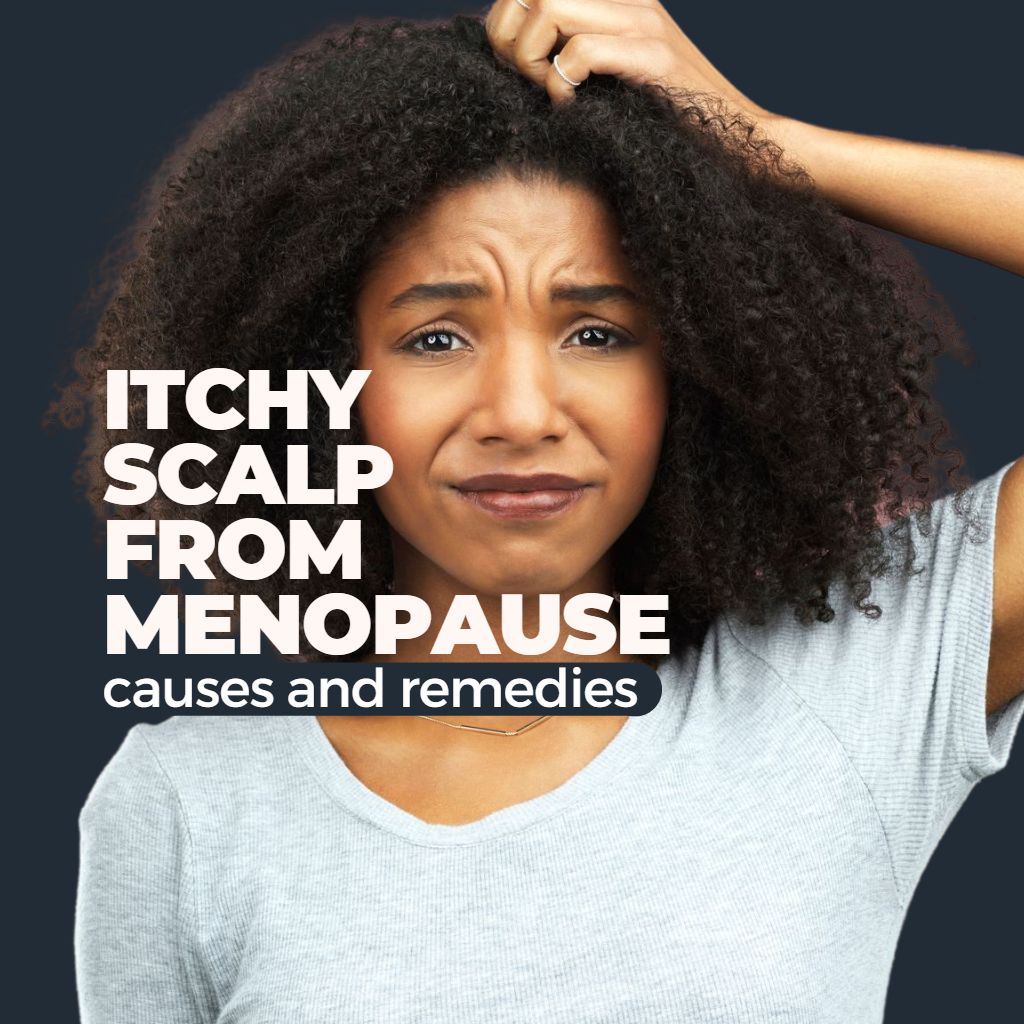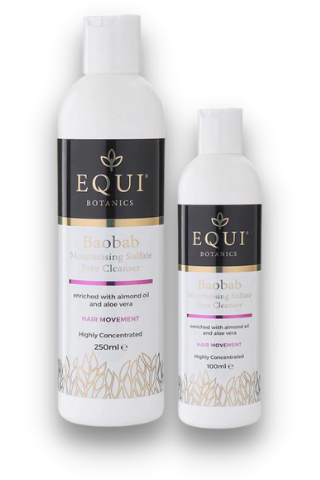
Menopause symptoms can be debilitating and affect everyday life in a big way. These symptoms generally come about due to a change in hormones and one common side effect is itchy skin, known medically as pruritis.
Pruritis comes about as a result of falling oestrogen levels during menopause. This reduction causes collagen levels to decrease and oil glands to shrink which results in itchy skin. It is not just the skin on your body that this affects, it can also reduce sebum production in the scalp, leaving it itchy and prone to dryness. The best way to resolve an itchy scalp is to maintain a balanced diet, introduce vitamin supplements and use gentle, balancing haircare products that cleanse the scalp and reduce a dry and inflamed scalp.
Can menopause cause an itchy scalp?

During menopause, hormonal changes can affect your entire body from mood swings, hot flushes, and fatigue. Menopause can also cause an itchy scalp. These changes also include a loss of oestrogen, which is linked to the production of collagen, the main structural protein in the body.
Oestrogen is integral to the oil production that keeps skin moisturised. The reduction of collagen and oil production is significant because they both cause a dry, itchy scalp. The good news is that this irritating side effect is not forever as menopause itching should end when the menopause itself subsides.
Symptoms
Some symptoms that accompany menopausal scalp itching include:
- Hair loss or bald patches
- Dry skin
- Irritated skin
- Sores
- Redness
- Scaly patches on the scalp
- Scalp swelling
Causes
The main cause of an itchy scalp during menopause is a decrease in oestrogen. Itching can be present from perimenopause and menopause but once the menopause has ended (post-menopause) which is at a point where you have not had a period for a year or more then the itching should go away.
There are, however, other underlying health conditions that could be causing itchiness. These include:
- Thyroid disease
- Scalp Psoriasis
- Allergic reaction
- Scarring alopecia
- Folliculitis
If you have persistent scalp itching for more than 3 consecutive days, it is best to consult with a doctor to rule out any further condition.
Menopause and Hair Loss
Decreasing oestrogen levels not only cause an itchy scalp but also female pattern hair loss because of the hormonal imbalance. Research has demonstrated a link between hair growth and oestrogen, as such your doctor may consider prescribing medication, such as HRT, to help boost oestrogen production. Taking oestrogen medication can help with any hair loss you may be experiencing during the menopause.
Consider switching haircare products to support your hair and scalp’s delicate state during menopause. Shampoo containing biotin has been proven to strengthen hair and the follicles as well as improve elasticity and prevent breakages. Biotin also helps menopausal hair loss by acting as a blocker for the androgen DHT, which is known to cause hair thinning.
Introducing naturally derived products that are gentler to your fragile hair and scalp is also beneficial. Using a targeted treatment such as our Black Seed Hair Oil Elixir on the scalp will increase blood circulation, stimulate growth and reduce itchiness.
Diagnosis
Whilst an itchy scalp isn’t life-threatening, it can be annoying and it can, on occasion, be linked to other health conditions. Seek medical advice if any of the following applies:
- You are losing weight
- You have swollen glands
- You’ve recently started new medication
- The itching is impacting your daily life
- The itching is all over your body
- You notice a rash, swelling or lump
Treatment
It is important to treat and relieve an itchy scalp to avoid further complications such as hair loss. Steps you can take to help include:
- Wash hair regularly- treat your scalp like your skin and cleanse it frequently. Your scalp is prone to product, sweat and oil build up and exposed to environmental pollution that needs cleaning to keep your scalp happy and healthy. Use our Hair Detangler and Cleanser to rid your locks of dirt and build up.
- Eat a balanced diet- it’s no secret that the foods you consume can affect your skin, and your scalp is no different! Oily fish such as salmon that are also rich in Omega 3 are a great food to eat that are good for your scalp health and have anti-inflammatory properties. Dairy products, high sugar content treats and even white wine can have a negative impact on your scalp.
- Supplements- Vitamin D is highly important in supporting scalp and hair health so consider introducing a supplement for this. As collagen production is slowed during menopause, it is worth considering a supplement for this also.
- Use a targeted hair treatment- there are a multitude of scalp treatments available on the market that can help maintain a healthy base for your hair. Our Babassu Oil Treatment Hair Masque is a multi-tasking treatment that will heal and protect the scalp whilst replenishing hair and promoting regrowth.
- Protect from UV rays- your scalp is prone to sun damage which can irritate and further aggravate itchiness. Consider using a UV hair protectant and in direct sun, use a hat.
- Avoid scratching- a challenging one but persistently relieving an itch with a scratch can cause further damage to sensitive skin on your scalp.
- Reduce the temperature- wash your hair using lukewarm water, whilst a steaming hot might be your favourite way to shower, it is not the preferred choice for your scalp. Water that is too hot can upset the balance of your scalp as well as cause dryness, damage, and irritation. The same goes for heat styling- where possible, let hair air dry!
FAQs
Can the menopause cause eczema?
Hormonal imbalances have a massive impact on the skin and with this bodily upheaval, there is a chance that the changes may cause eczema.
How can I thicken my hair during menopause?
Hair thinning and loss is upsetting at any point but can be particularly stressful during the menopause. Eating protein and iron rich foods can work to strengthen hair. Try regularly massaging the scalp too, using a product such as black seed oil, which helps stimulate blood flow to the scalp, preventing further loss whilst encouraging regrowth.
Key takeaways
Itchy skin is yet another irritating side effect of the menopause however with some lifestyle and haircare changes, symptoms should be relieved within a few weeks. If symptoms persist, it is important to seek medical advice so they can advise on whether a prescription for oestrogen-based medicine is necessary.





